Dmitry Suvorov: It will not be possible to replace with robots people whose activities are connected with creativity
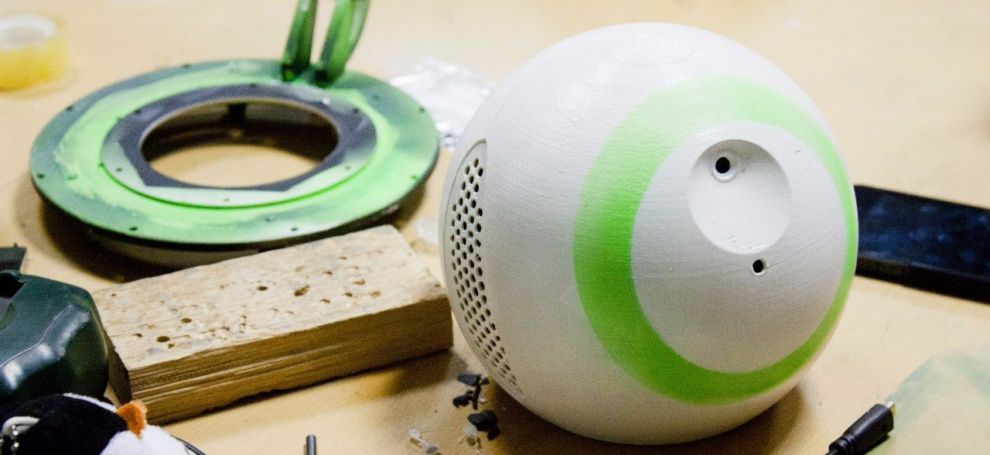
Lexi is the perfect home assistant , and in the first version he promises to be a multifunctional robot. We wanted to learn more about this project and its team. RoboHunter spoke with Lexy CEO Dmitry Suvorov to share with his readers interesting details about Lexi's robot and trends in robotics.
')
RoboHunter: Dmitry, tell us about the developments of your team.
Dmitry: Our team is working on Lexi's intelligent home assistant. This is a desktop device with artificial intelligence on board. It understands natural human speech, can pleasantly communicate with its masters, knows how to search for necessary information on the Internet, and is able to control household appliances. Our Lexi is not just a robot, it is a living creature with character and emotions. We want to make him not an agreeable helper, but a pet or friend, so that people get used to him and he gradually became a natural part of their life - like a TV, computer or smartphone.
Working on such a project, we realized that Lexi would be involved in family communication. He will be able to see and hear a large amount of personal information - everything that happens in your home. And here it is important not to allow its leakage or access by intruders to your home through our robot, so we concentrated all the processing of incoming sound and video right on board of Lexi.
Lexi is the only device of this kind that performs speech recognition and synthesis, as well as semantic information processing directly on its processor without the need to connect to the Internet.
RoboHunter: What are your company's plans at the moment?
Dmitry: Short-term plans - the completion of the development of embedded software, the refinement of the manufacturability of the product for mass production. Medium-term - the beginning of sales in the Russian market and access to crowdfunding in the English-speaking market. Long-term - to become a Russian and international brand engaged in the development and sale of home robots.
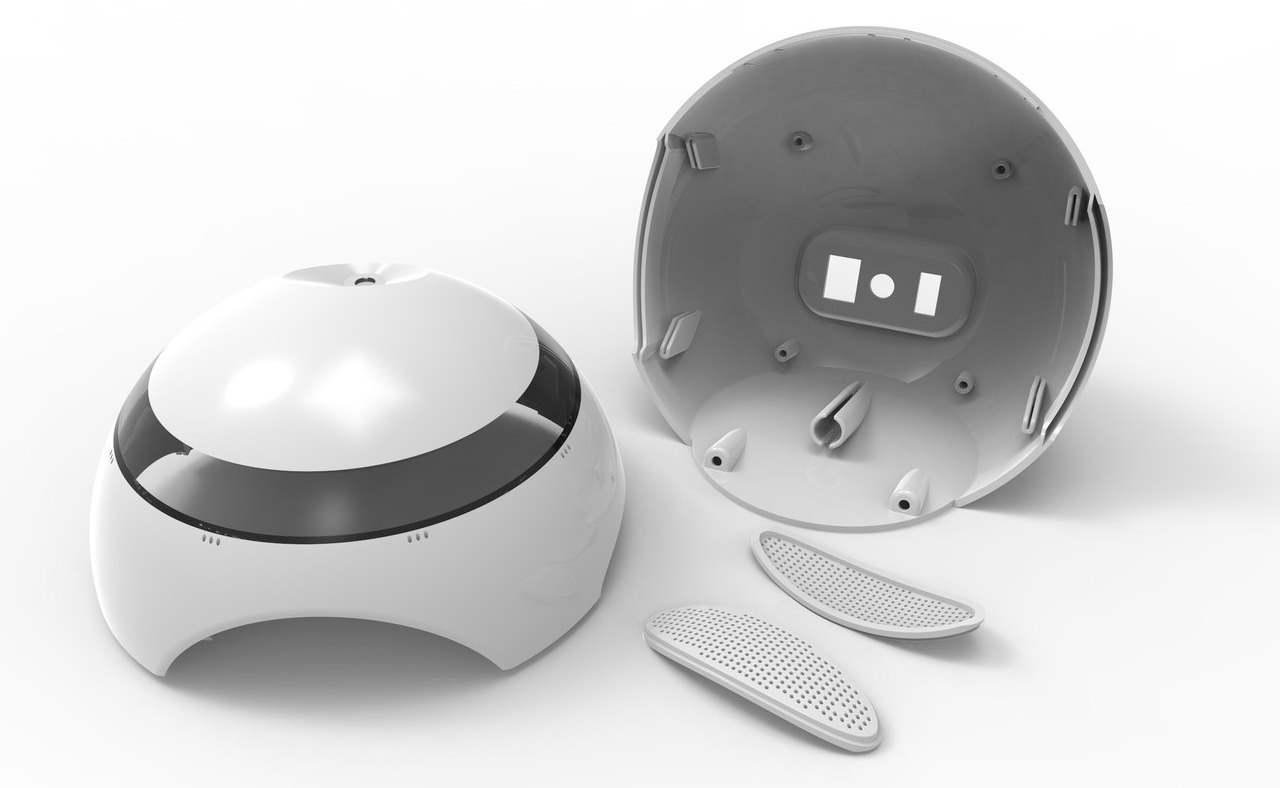
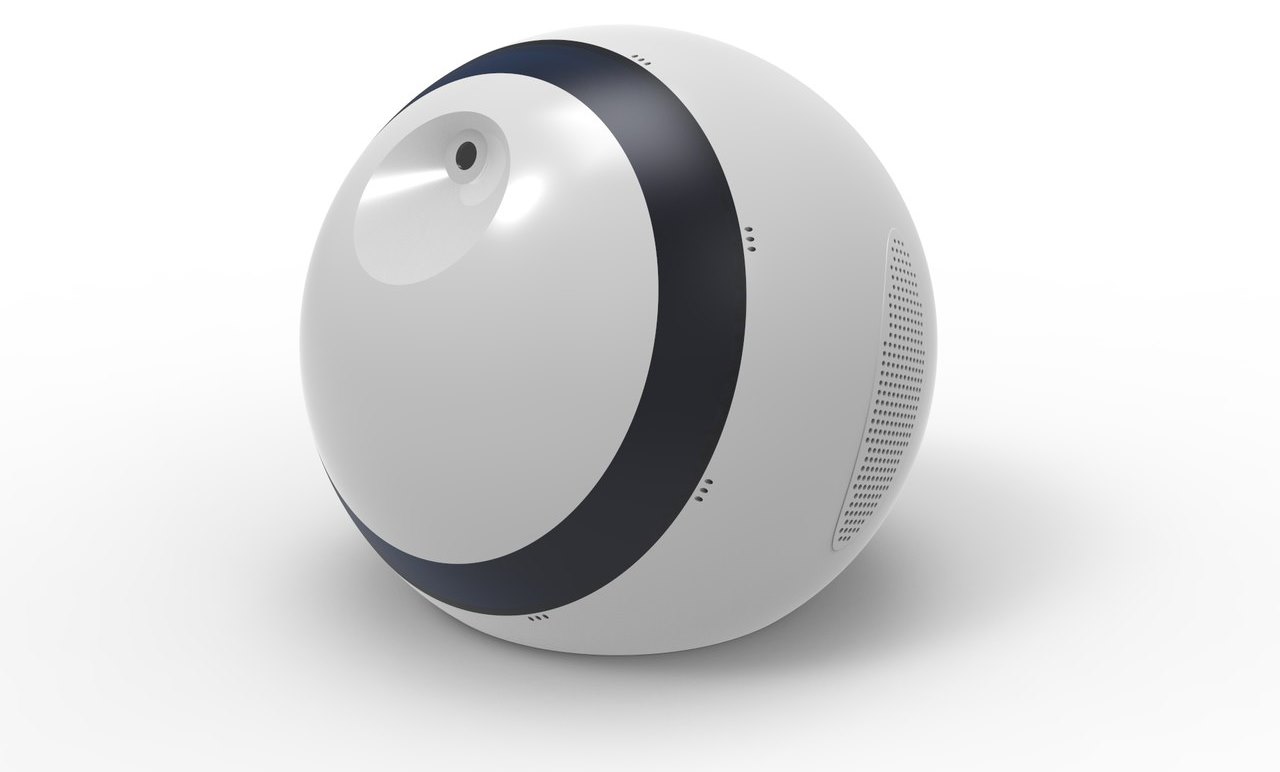
RoboHunter: Do you think people are ready to accept robots into their daily lives?
Dmitry: I think we are ready. But in the near future it will not be robots-androids from science fiction films, but specialized home devices that solve a small number of problems of their owners. Vacuum cleaning robots or floor washers for cleaning. Lawnmower robots - for working in the garden. Our Lexi is for communication and information.
RoboHunter: Can robots really replace people in many professions? Your forecast for the next 5 years.
Dmitry: In many professions - no. But in some areas, robots can really succeed.
For many years already, robots have been working in factory workshops on conveyors and welding. They work as deliverers in the warehouses of leading companies. Robots build maps of cities in the company, driving a car. In mining, robots drive trucks with the breed. Robots are used by the military. In the near future, they will be able to replace consultants and cleaners, for example, the Russian company Vikron is creating a model that can work as a promoter and consultant in shopping centers.
RoboHunter: What are the most popular applications of robots today?
Dmitry: Automation of production in the first place in the number of implementations of robots. Then - military applications. Further, robots-vacuum cleaners, telepresence robots, lawn-mowers robots are far behind.
RoboHunter: What do you think about negative opinions about the future of robotics (many people think that human labor cannot be replaced by robots)?
Dmitry: I think that it will not be possible to replace with robots people whose activities are connected with creativity and the solution of non-standard tasks. There are a huge number of such professions - scientists, engineers, doctors, managers, and many, many others ...
RoboHunter: What are your thoughts on the current state of the Russian robotics market?
Dmitry: In the Russian consumer market there are mainly foreign players - manufacturers of home and service robots. In the market of solutions for state structures, on the contrary, Russian players dominate. The consumer market of robotics in our country is in its infancy, as well as throughout the world. We need to look for niches and work in them. Of course, the volume of the Russian consumer market of robots is much less than the American one. Our market can be considered as a launching pad for entering the world.
RoboHunter: What are the latest trends in the world of robots? What are global robotics manufacturers doing now?
Dmitry: Now the trend is to find new home robots that are in demand by the market. Robot vacuum cleaners have become widespread, but still significantly fall short of sales to computers or smartphones. There is nothing to say about lawn mowers, window or pool washers.
The latest trend is the development of home voice interlocutor robots: our Lexi, American startup Jibo, solution from Amazon - Echo.
RoboHunter: What are the differences in the development of robots in Europe and Asia?
Dmitry: In the same Japan, robotics has become a part of culture. They make android robots so that they play the flute, keep the news, play games. In Japan, a lot of social and psychological research is carried out on the interaction of robots and humans.
In Europe, a more pragmatic approach: they make mostly robots that solve pressing human problems: they can stand behind the conveyor, inspect the sewers, dive deeper.
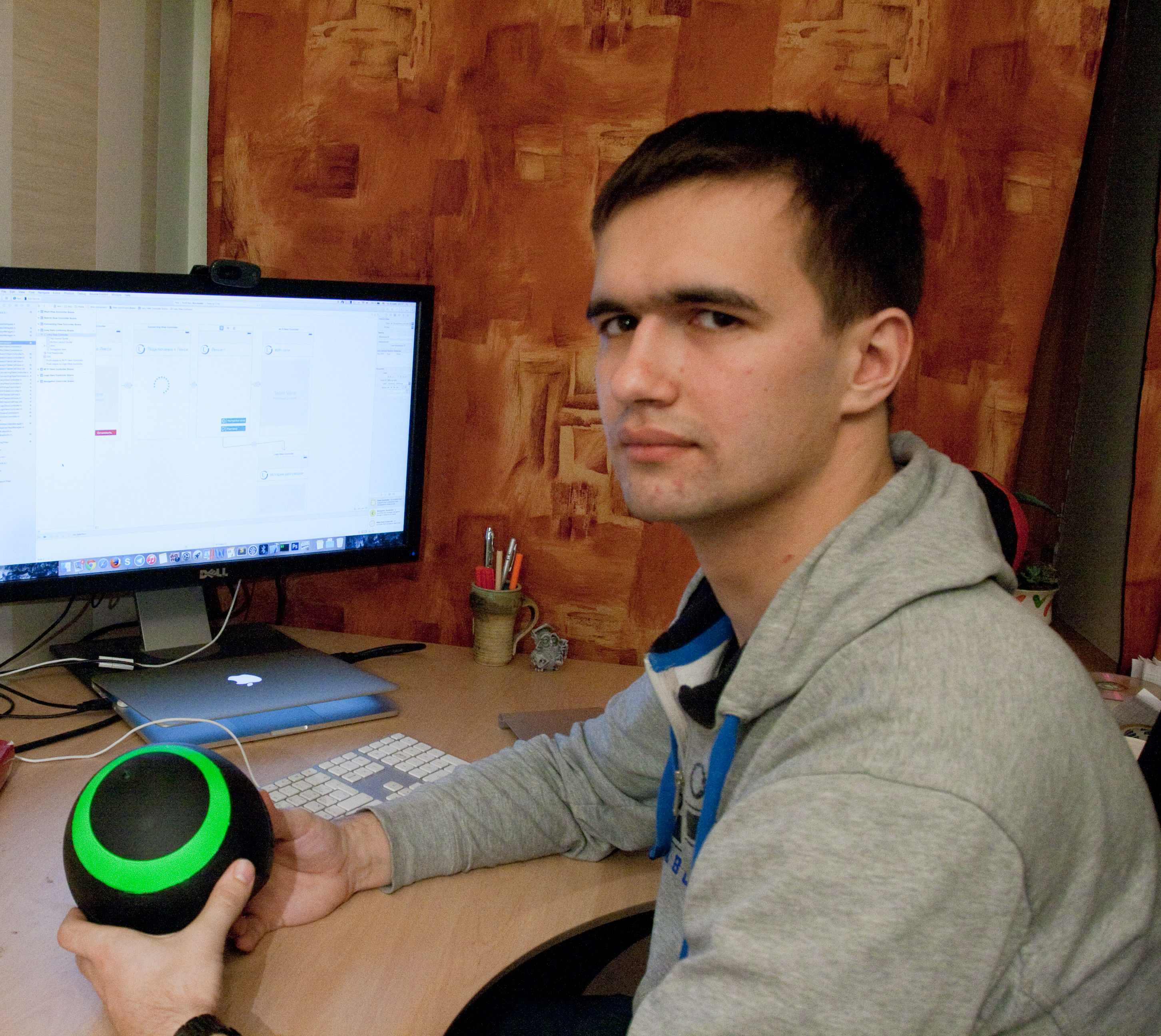
RoboHunter: How should the state support domestic manufacturers of robotics?
Dmitry: In Russia, there are programs to support technology start-ups in various industries, including robotics. For example, the Skolkovo Foundation, of which we are residents, gives tax benefits to its residents and provides grants for the development of promising projects.
RoboHunter: Do you think it is more profitable to produce robots in Russia for further sale or for rent?
Dmitry: It depends on the company's strategy. Personally, it is more interesting for me to make a mass or serial product for sale to final consumers through sales channels. The rent can also be done, but not as a main activity.
RoboHunter: What robot would you definitely buy for yourself?
Dmitry: I am in debt to the profession enjoyed a large number of robots. Now I believe that our Lexi will be the most useful and sought after of them.
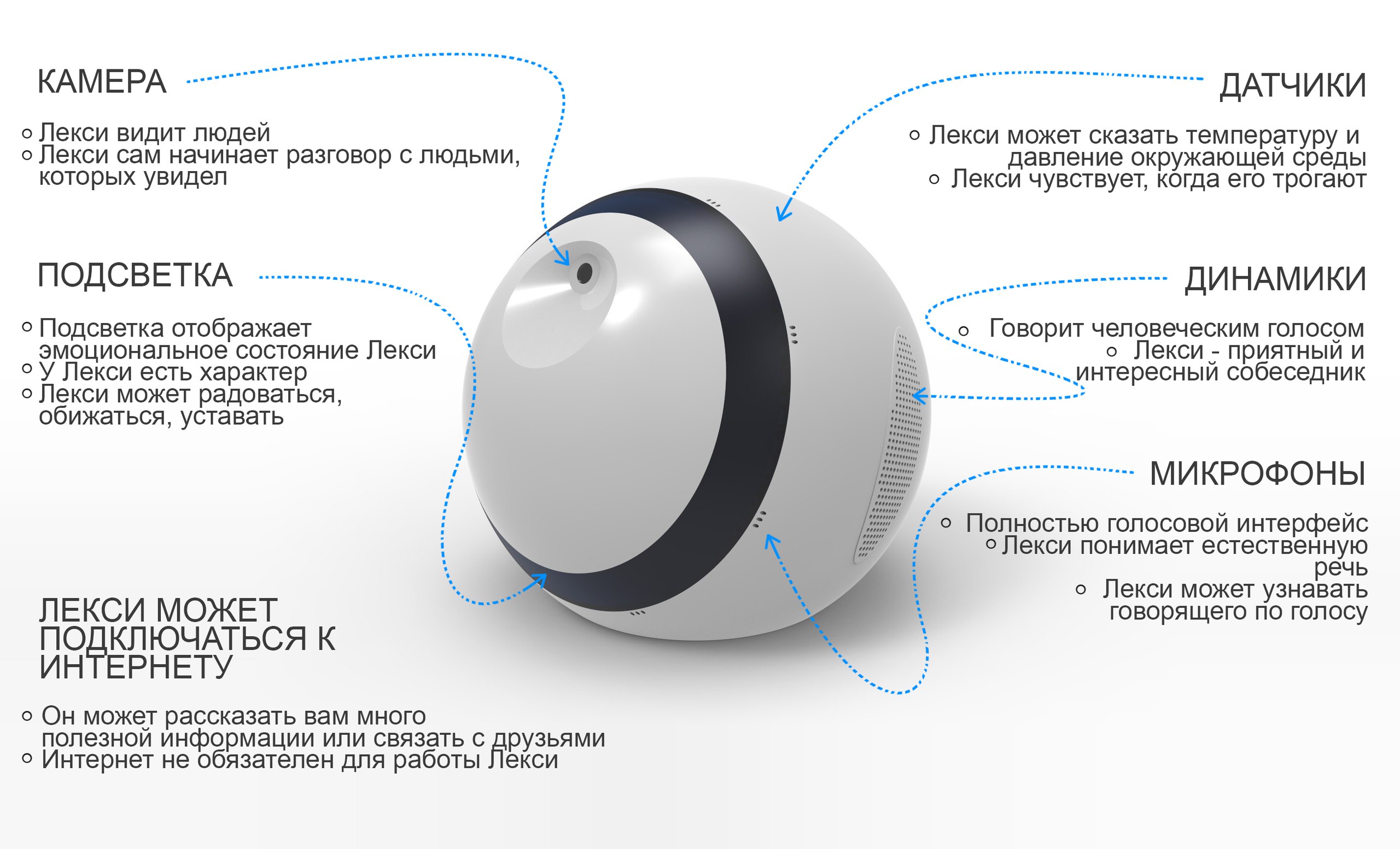
RoboHunter: Sometimes human-like robots that express emotions look scary and frightening . Is this credibility necessary?
Dmitry: If you are talking about android robots, then I do not believe that in the next ten years they will reach a level of development and cost at which people can be useful and necessary. Now they are more research projects.
But robots can express emotions not only by facial expressions. Our Lexie does this with a voice. Due to this, communication with him is more natural, pleasant and interesting. I think this is his important trait.
RoboHunter: How do you like the idea of robot scientists who can make discoveries themselves?
Dmitry: Such programs appeared at the dawn of the birth of artificial intelligence. They are able to independently prove theorems, for example. But you need to understand that they work according to a certain algorithm and solve only formalized tasks, unlike a person.
RoboHunter: There are a lot of robots with AI, what is Lexi’s advantage over them?
Dmitry: In terms of details of technical advantages, you can see our comparative table for the declared characteristics .
As for the domestic competitor ... “Cubic Robotics” takes its beginning in the company “Ashmanov and Partners”. There they worked on the project of the household companion, but at one moment decided to leave to do it independently. So they separated from us. We are significantly different from them. Lexi is equipped with a camera that greatly expands its capabilities. It allows you to make calls over the Internet to other Lexi devices. Finally, we consider it fundamental to work without an Internet connection: communication with Lexi should be as comfortable as possible. Accordingly, the delay in determining the voice when working with recognition from Google will greatly reduce the quality of communication. In addition, when the network is disconnected, our device will still be useful, unlike its counterparts. The function of personalizing communication through the identification of a person by voice and face in this segment of devices will be implemented for the first time, which will allow Lexi to adapt to each family member and guest to communicate with him. We know our product is better. But we will have to bring it to consumers. Wins the one who can make the device that will be used.
RoboHunter: How much are these personal assistants in demand now?
Dmitry: We can estimate the demand for the device so far only indirectly, paying attention to the cash fees of foreign competitors, comments in our own community, personal messages from subscribers, the number of contacts left to alert you about the start of sales.
A lot of ideas come from subscribers . And most of them are written with full awareness of the possibility of their implementation. Some of the ideas can be found in the topic of our community .
RoboHunter: What market is the company focused on?
Dmitry: The company is focused on the market of voice assistants. Despite the fact that the device can be positioned as an interlocutor for the whole family, a teacher and tutor, a consultant, a personal assistant, a smart home, we especially focus on live communication with the user.
RoboHunter: What advice would you give to young professionals who want to create a startup in the field of robotics?
Dmitry: They need a breakthrough idea, a qualified team and a clear development plan. If all this is available, they will be able to receive financing for development from investors or funds.
Source: https://habr.com/ru/post/368995/
All Articles